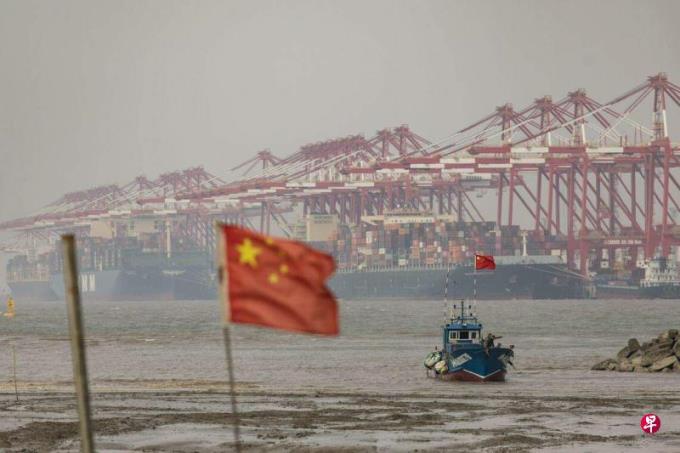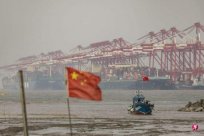
Generally speaking, the western business community attaches great importance to economic connection with China, but this reflects large enterprises with rights and influence.In the number of enterprises and the number of employees accounting for the majority, "other enterprises" have lost their enthusiasm for China.This is also one of the reasons for the recent strict attitude of Western politicians to China.
The recent negative news of the Chinese economy continues, and the topic of foreign investment is no exception.The Ministry of Commerce of China announced the cumulative amount of foreign investment from January to July this year (about $ 149.6 billion), a year -on -year decrease of 9.7%.In addition, the net direct investment liabilities announced by the Foreign Exchange Administration (the amount after deducting the capital recovery part from the new investment part due to the withdrawal or the reduction of the scale) has increased by 15.5 billion US dollars in the first and third quarters, and and with the third quarter, and withThe increase of US $ 152.4 billion in the same period last year decreased by 90%.In the third quarter, this number appeared for the first negative value since the beginning of 1998, at $ 11.8 billion.
First of all, the worsening of the business environment of foreign companies has reduced foreign direct investment.
With the confrontation between China and the United States, the United States' implementation of high tariffs and trade restrictions on China has made it difficult to export from China to North America, which has transferred many assembly plants from China to Southeast Asia and Mexico.In this regard, in order to ensure economic security, by promoting the localization (localization) of the supply chain, and the formulation of anti -spy law, the business environment of foreign -funded enterprises is gradually deteriorating.
The most important thing is that China's economic growth has slowed down, making foreign companies that have always pinned their dreams in the wide Chinese market.
The impact is not only manifested in direct investment, but also in trade.China ’s export ratio for the United States, Europe, and Japan accounted for 51.3%in 2018, and 45.3%in the first half of this year, a decrease of 6 percentage points; the export of the United States alone reduced by 4.8 percentage points within five years.This shows that due to the influence of high tariffs and discounted atmosphere, not only foreign companies, but also Chinese companies have also begun to transfer the assembly factories overseas.As a result, China was worried that domestic industries were vacant, and Western countries cheered "reducing economic dependence on China."
Do foreign companies intend to abandon China?
However, if you look more carefully, you will see different facts.Simply mistakenly believe that foreign -funded enterprises are abandoning China, and it is delusional.
Indeed, China's foreign direct investment has continued to grow up year -on -year from April this year. However, recently in foreign direct investment in foreign countries, Hong Kong funds account for three -quarters, many of which are the return investment of mainland companies.At the same time, the domestic investment in private enterprises in mainland China has decreased by about 20%compared with the same period last year since April this year.It can be speculated that since April this year, mainland companies feel uneasy about their prospects and reduce investment, and also lowered the foreign direct investment share through Hong Kong.
In addition to Hong Kong, does foreign investment in foreign companies such as Japan, the United States and Europe have not decreased?The answer is both "yes" and "negative".
Recently, the Chinese government has repeatedly pointed out that Western countries' investment in China is expanding.According to Chinese media reports: "From 2019 to 2022, the average investment scale of a single item increased by 45%to $ 4.91 million. Investment in the contract investment exceeding 100 million US dollars accounted for 53%in 2022, 653.5 billion yuan, in January 2023, in January 2023, in January 2023In March, it reached 223.3 billion yuan, an increase of 10.4%. ".
This can be regarded as large -scale investment in China.Global companies that have obtained tens of billions of US dollars in industries such as automobiles, information technology (IT), pharmaceuticals, etc., still adhere to the Chinese market.
On the other hand, more and more small and medium -sized enterprises have withdrawn or narrowed the scale from China, which is different from when Western SMEs entered a factory in China 20 years ago.In other words, Western companies are differentiated in China.
Generally speaking, the western business community attaches great importance to economic connection with China, but this reflects large enterprises with rights and influence.In the number of enterprises and the number of employees accounting for the majority, "other enterprises" have lost their enthusiasm for China.This is also one of the reasons for the recent strict attitude of Western politicians to China.
As mentioned above, the export ratio of China for the United States, Europe, Japan and other countries is declining, but behind it, the trade and investment relationship between China and Asians has been rapidly expanded and deepened.The biggest exit orientation.
The impact of the development of Chinese electric vehicles
This is because of the influence of the opposition between China and the United States, and the assembly factories transferred overseas continue to import machinery, parts, and materials from China.From the perspective of the details of export varieties, the export share of smartphones and personal computers with low added value has declined; on the other hand, the rising share of machinery and materials proves this change.The improvement of Sino -US opposition and "economic security" awareness, on the one hand, has led to the emptiness of China's assembly industry, and on the other hand, it also increases exports of upstream industries.
China's export growth is not just parts and materials.Recently, electric vehicles (EV) have attracted much attention.The Chinese automobile exports, which are mainly EV, totaling 4.24 million units from January to October this year, an increase of 62%year -on -year, surpassing Japan to become the world's largest car exporter.Not only is it exported, domestic cars centered on EV also exceed foreign brands, showing the momentum of rapid growth.
There are three reasons for the rapid growth of Chinese EV.The first is the rapid improvement of the EV performance centered on battery, and the second is that China has changed the practice of repeated failed in the past (subsidies for the supply of enterprises). The purchase subsidy for the demand party is implemented to implement a new industrial policy based on a competitive mechanism.The third is due to the powerful supply of China's manufacturing and software industry.
China also has the technical level and supply power of other countries in the core components of EV headed by battery.This is a ring that conforms to President Xi Jinping's "Let the World Relying on the Chinese Supply Chain" policy in 2020. Chinese companies are constructing upstream industries that start in overseas mines and go to the entire uninterrupted supply chain of the downstream industry assembled in the entire vehicle assembly.Essence
Cars and chips are the main battlefields of the Chinese and Western economy
The automotive industry has a huge supply chain. It is the employment field of many people. It is an unparalleled industry. Therefore, the industry and growth are easy to be politicized.In particular, cars have always supported the commercial pillar of Western countries in China.Recently, Mitsubishi Motors of Japan announced that it has withdrawn from China. If foreign brand cars continue to withdraw, not only car manufacturers, the ecosystem of foreign financial and professional services around it will also decline, which may lead to the entire business scale of Western countries in China in ChinaSignificantly reduced.If China's EV shows the momentum of driving over Western automakers in the global southern market, economic contradictions between Western countries and China will rise in one fell swoop.
The chip is closely related to security, and the chip is becoming more political than a car.This is another area that may have a huge impact on the entire economic relationship between China and the West.
The restrictions on the implementation of Chinese chips in October 2022 have caused a huge blow to China. However, China seems to have successfully produced 7 -nanometer -class chips through unlimited manufacturing devices and work hard on its own technology.Earlier, the United States found a balance point between the security demand and the interests of the chip industry, trying to control the restricted object to minimal, and as much as possible to prevent China from obtaining chip technology as a "small courtyard wall" policy.However, if it is considered that the current control is not enough, it is possible to expand the "courtyard" (restricted object).In this way, the development and growth of Chinese chips willIt will be further hindered, and the commercial interests of the Western chip industry will also be damaged.
China also from the perspective of ensuring economic security. By promoting the localization of old -fashioned chips outside the previous generation, the dependence on foreign -produced chips is reduced.China is used in the needs of chip demand in the fields of home appliances, IT machines, and automobiles accounting for 30 % of the needs of the entire world. It is the largest and most important market for the chip and manufacturing devices of Japan, the United States and Europe.If the market is excluded, the chip industry in Japan, the United States and Europe will be hit hard.If traditional Chinese chips rising under government subsidies and start to occupy the global market at low prices, economic contradictions between Western countries and China will be further upgraded.
Globalization reverse leads to the stagnation of the world economy
From the above examples, we can see that each other between China and the West is constantly rising, globalization has accelerated inverted, and commercial risks and high costs are everywhere.If it is difficult for countries that do not trust each other to maintain free trade, this trend is not surprising, and if the increasing confidence is due to the reduction of the gap between China and the United States.The intensification of anxiety and distrust, or simply, if it is due to the weakening of the US hegemony, it brings a historical change, at least it is extremely difficult to restore mutual trust in the short term.
In the near future, whether it is Western countries or China, business people may miss "or (the United States hegemony system dominates the world) at the beginning of the 21st century is easy to buy and sell."
The author is a visiting researcher at the Institute of International Issues of Japan, an expert in modern Chinese research



